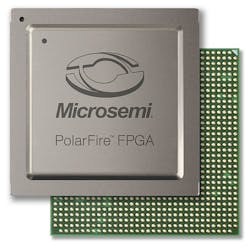Low-power, cost-optimized PolarFire FPGA for military and commercial aviation introduced by Microsemi
ALISO VIEJO, Calif. – Microsemi Corp. in Aliso Viejo, Calif., is introducing the PolarFire field programmable gate array (FPGA) product family for military and commercial aviation, industrial automation, cellular infrastructure, and Internet of Things (IoT) applications.
The cost-optimized PolarFire FPGAs delivering low power at mid-range densities with 12.7 gigabits per second serializer/deserializer (SerDes) transceivers as well as security and reliability.
The devices are for defense and aerospace applications like encryption and root of trust, secure wireless communications, radar and electronic warfare (EW), aircraft networking, actuation, and control.
The FPGA product family also addresses concerns over cyber security threats as well as reliability concerns that face deep submicron SRAM-based FPGAs as they relate to single event upsets in their configuration memory.
"PolarFire FPGAs enable customers to forego purchasing FPGAs with higher power and cost to obtain the 12.7G transceiver performance required for many mid bandwidth applications, while extending the benefits of our ultra-low power, high reliability, and high security," says Shakeel Peera, senior director of SoC product marketing at Microsemi.
Related: Intel to boost integrated microprocessor and FPGA offerings with acquisition of Altera
Microsemi has been engaged with select customers in its Early Access Program, and adoption of the product family has already begun.
In collaboration with Silicon Creations, Microsemi has developed a 12.7 gigabits per second transceiver optimized to be area efficient and low power, resulting in total power of less than 90 milliwatts at 10 gigabits per second.
The devices offer static power of 25 milliwatts at 100,000 logic elements, zero inrush current, and standby power of 130 milliwatts at 25 degrees Celsius. Microsemi also provides customers with a power estimator to analyze power consumption of their designs. After implementation, the SmartPower Analyzer can be used to access full design power.
The FPGA family also provides reliability with its inherent immunity to configuration single-event upsets, as well as built-in single error correction, double error detection, memory interleaving on large static random access memory, and system controller suspend mode for safety-critical designs.
Related: Intel puts ARM microprocessor inside FPGA for high-performance embedded computing
PolarFire FPGAs offer Cryptography Research Inc. (CRI)-patented differential power analysis (DPA) bitstream protection, integrated physically unclonable function (PUF), 56 kilobits of secure embedded non-volatile memory, built-in tamper detectors and countermeasures, random number generators, Athena TeraFire EXP5200B Crypto Co-processors (Suite B capable) and a CRI DPA countermeasures pass-through license.
Microsemi's Libero SoC Design Suite offers a design flow with Synopsys Synplify Pro synthesis and Mentor Graphics ModelSim Pro mixed-language simulation with constraints management, and Microsemi's differentiated FPGA debugging suite, SmartDebug. Popular IP solutions for 1G Ethernet, 10G Ethernet, JESD204B, DDR memory interfaces, AXI4 interconnect IPs and others are available for use with PolarFire devices.
For more information contact Microsemi online at www.microsemi.com/products/fpga-soc/fpga/polarfire-fpga.
Learn more: search the Aerospace & Defense Buyer's Guide for companies, new products, press releases, and videos
